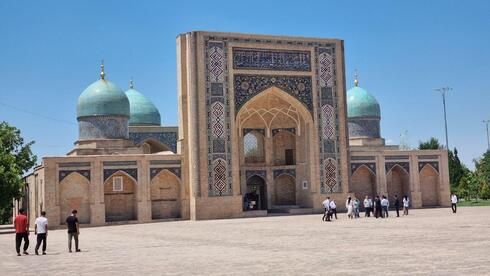“In 2019, investors literally asked us where Uzbekistan was on the map. Today, many of them come to Tashkent asking a very different question: when is the next issuance?” said Jasur Karshibaev, an adviser to the minister of economy and finance, describing the country’s dramatic transformation.
Historically a key stop along the ancient Silk Road and later a peripheral Soviet republic, Uzbekistan is now experiencing a resurgence, attracting unprecedented levels of foreign investment. As sanctions isolate neighboring Russia over its war in Ukraine, Uzbekistan’s economy is gaining momentum, with President Shavkat Mirziyoyev aiming to double its size by 2030.
According to Bloomberg, major financial institutions such as Citibank and JPMorgan have opened offices in the capital, Tashkent, a city with over 2,000 years of history. Investors from China, Turkey and the Middle East are pouring in, while American and European firms monitor developments. Companies from Australia to Sweden are also exploring opportunities.
Saudi Arabia’s ACWA Power is reportedly involved in $15 billion worth of renewable energy projects in the country. According to the state-run Investment Promotion Agency, Uzbekistan expects to see a surge in foreign direct investment (FDI) to $42 billion this year, up from $11.9 billion in 2024.
Uzbekistan’s economy has doubled since 2020 to over $100 billion, buoyed in part by rising gold prices. The mineral-rich country is a significant producer of the precious metal.
China has now overtaken Russia as Uzbekistan’s top financial partner, accounting for 28% of foreign investments and loans, according to regional consultancy Macro-Advisory. The shift underscores the country’s evolution from an isolated, landlocked Muslim nation—where citizens once needed state permission to travel abroad and few had bank accounts—to one with open borders and a growing fintech sector.
“When payment systems and mobile applications developed, we saw people take their money out from under the pillow and bring it to the banks,” said Abror Mirzo Olimov, deputy chairman of the Central Bank of Uzbekistan. “No country can develop only through borrowing. Investors also bring technology, methods and knowledge”
The turning point came in 2016, following the death of longtime authoritarian leader Islam Karimov, a close ally of Russian President Vladimir Putin. His successor, President Mirziyoyev, opened the country to global markets while maintaining strong ties with Russia and resolving border disputes with neighbors such as Tajikistan.
Like any emerging market, Uzbekistan carries risk. Political opposition is weak, and human rights abuses remain a concern. Though it has steadily improved on Transparency International’s Corruption Perceptions Index since 2018, it still ranks 121 out of 180 countries.
“The question is whether the country will be able to execute successfully on its economic reform plans because right now the market is pricing in a lot of good news,” said Zsolt Papp, an investment strategist at JPMorgan. Much of the progress is attributed to Mirziyoyev, who in 2023 secured constitutional changes that could allow him to stay in power until 2037.
The country’s growth is also fueled by its youthful population—more than half of Uzbekistan’s 38 million citizens are under 30. The rise of fintech and digital payments is seen as a clear symbol of modernization.
Uzbekistan’s rising appeal contrasts sharply with Russia’s diminishing role in global finance. At President Putin’s economic forum in St. Petersburg this June, once a magnet for global business leaders, high-profile names were again absent for a fourth consecutive year. In stark contrast, a similar forum held just a week earlier in Tashkent attracted major companies such as Coca-Cola and Boeing. The American aerospace giant signed an $8 billion deal with Uzbekistan Airways, which received public endorsement from both U.S. President Donald Trump and President Mirziyoyev.

